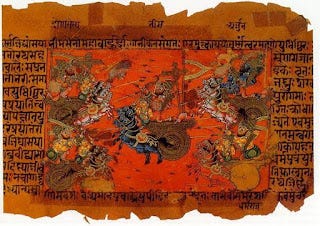Originally published on my blog December 7, 2016.
Image: Dr. Louise Banks tests the aliens' linguistic capabilities.
Last night I finally saw Arrival. The film hasn't been released in Singapore, so I had to avoid spoilers and watch it during my break in the US. It was worth waiting for, although I guffawed at a few points and found the major reveal to be disappointing. (My post below has spoilers.)
I won't bother summarizing the movie's plot--you can search online for that. What follows are some scattered thoughts, not an essay.
The film is beautiful, both in terms of visual and emotional aesthetics. I liked the playing with memory which it involved--it raised some interesting questions about what it would be like to experience "memories" of the future. It seems like Louise doesn't gain omniscience about her entire life, but glimpses.
I was reminded a bit of the ensō when the "logograms" appeared. I wonder if this was intentional, especially given the themes of the film (the many become the one, there is no time, etc.) which felt very pop-Zen.
One major theme was introduced early by a strange use of Sanskrit. Louise asks the army captain to ask the other linguist he's interviewing what the Sanskrit word for war is, and how it is translated. I take it she means its etymology, since, well, the translation would be "war." The word she was thinking of, apparently, was gaviṣṭi, a compound etymologically meaning, "desire for cows." That's not the only word for war in Sanskrit, though, and not even the one that might first come to mind! Apte's English-Sanskrit dictionary, for instance, lists:
War, Warfare, s. vignahaḥ, saṁgrahāraḥ, vairāraṁbhaḥ, vairaṁ, saṁgnāmaḥ, yuddhaṁ, raṇaṁ, (a particular battle).
Image: The Battle of Kurukṣetra
In any case, the idea, I think, was that something important was revealed by the rival linguist's failure to translate gaviṣṭi as "desire for cows"--he said "argument" which isn't even close. What that thing is was opaque to me. The aliens don't speak Sanskrit, translation of an established language is different than understanding a new one entirely, and hopefully one judges linguists by more than their translational skills (being a linguist is not necessarily about translation, a point of confusion that's probably fairly common). However, the idea of avarice as the root of war is important to the film, and perhaps that's why the filmmakers (or the original author--not sure if this was in the book) included it.
There were some other points where I was frustrated:
Why have a theoretical physicist as one of the only two leader team members engaging with the aliens? Why not a biologist? (And why not rotate people rather than rely on the same two every 18 hours for a month?)
Saying to a linguist, as the physicist does, that she approaches language like a mathematician was a "duh" moment for me. I mean, yeah, that's what being a linguist is! But I suppose that's an insight to a lot of people, and was important for his character to recognize.
At one point, the army captain, referring to the first contact between the British and the aboriginal peoples in Australia, called the British a "more advanced race," in obvious analogy to the aliens coming into contact with the humans. I wish the film had done more to distance itself from that trope, since the captain was a sympathetic enough character that I doubt many people took that as anything other than an obvious truth.
The idea that such rapid progress could be made in understanding an alien language in 28 days in the kind of context shown is pretty ridiculous, especially since the words being used at the end were things like "weapon" and "technology"! There's not a good way to test whether you and the alien are actually communicating. Imagine you say "arm" and wave your arm. In response, one of the heptopod waves their long leg-like things. They do this regularly when you say "arm." That seems promising. But, as Quine points out--and Louise does with her fake example of "kangaroo" meaning "I don't understand"--we haven't a clue what, if any, their theory of reference is, or even if they have one, or if our translations are accurate. Remember, these are creatures who supposedly experience time in a very different way than we do--and probably also the physical world, and their own bodies. How can we guarantee they are referring to the same thing we are when we say "arm"? Then there is the problem of holophrastic indeterminacy--which is hinted at by the movie in a few places. We could be massively mistaken in our interpretation of the logograms--perhaps we have an internally coherent interpretation that doesn't map onto what's being said.
Also, the focus on what's being said was a big problem with me. The movie focuses on semantics--though it doesn't put it in those terms. But human beings use language not just as a system of symbols, each one with a paired meaning, but as a tool for suggesting, implying, hinting, joking, and so on. Do the aliens do this? How would we know? Pragmatics in this sense involves understanding of culture, environment, conventions... which is a massively big barrier for two researchers who are separated from loating heptopods by a thick glass.
Finally, my big gripe. The Sapir-Whorf hypothesis. When it was first introduced, confusedly, in a dream sequence (as being about the brain's "rewiring" when learning a foreign language!), I groaned and slumped in my seat, since I thought I knew where the movie was going. Learning an alien language means learning to think like an alien! But I hoped...Nope, that's it. The "weapon"/"gift" is the gift of language. But not just the gift of understanding a new language--that wouldn't be sufficient. It is a gift which profoundly transforms the human experience through a different perception of time. I think this is what bugged me the most. I am a fan of sci-fi that has big ideas, and involves leaps of credulity. I'm a Star Trek fan, after all, and technobabble there famously fills in the gaps all the time.
However, in this case, the movie began with a nod to realism. Further, in my opinion, the human experience could be profoundly transformed simply by learning an alien language and having contact with a new, sentient species. Just that should be enough to be awe-inspiring and captivating. (Frankly, so is learning a new human language.) And here I think--though maybe I'm reaching--I get a whiff of Orientalism. Put together the ensō, with the quasi-Zen language, and the linguistic determinism (I haven't touched the presentation of Chinese culture in the film) and it sounds like the kind of view a first-year undergrad encountering Chinese philosophy for the first time might have. She might think that, just in virtue of learning classical Chinese and its logograms, and reading some Zhuangzi, she will come to understand time in a profoundly different manner. And, well, there is some research being done about the relationship between the experience of time and Chinese (and other languages). But the results are pretty boring in contrast to the movie's implications:
...not only does Chinese have no morphological tenses but there is no need to resort to covert semantic features under a tense node in order to interpret time in Chinese...[1]
It is concluded that (1) language is a powerful tool in shaping thought about abstract domains and (2) one's native language plays an important role in shaping habitual thought (e.g., how one tends to think about time) but does not entirely determine one's thinking in the strong Whorfian sense....[2]
Those are my thoughts, in general. I enjoyed the movie, and I realize most of my gripes are ones that other viewers probably won't have. If the movie gets people interested in language studies--whether linguistics or philosophy or learning new languages--that would be a good consequence. I just don't think that we should tie human improvement so closely to merely learning a language. It involves how we use it, as well.







